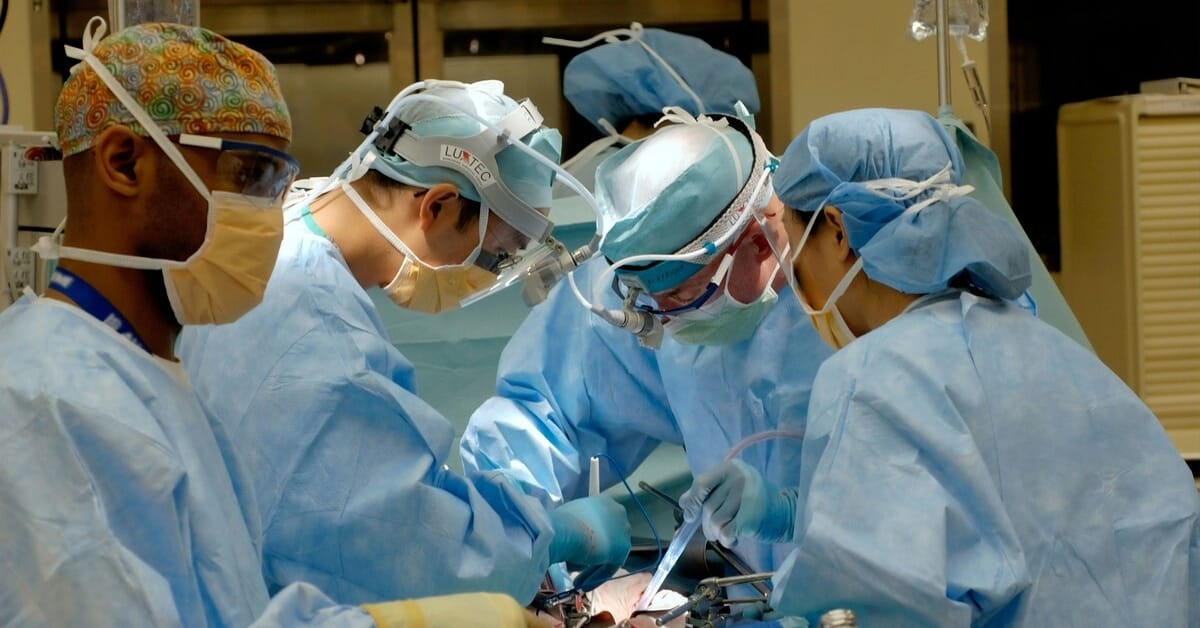In the operating room, besides performing the actual surgery, the surgeon must lead a team of doctors, nurses, and staff to ensure a successful procedure. That’s why apart from being dextrous and skilled, they must also have good problem solving skills and exercise sound decision-making under pressure. This gives the misconception that people who become surgeons are cold and tough individuals.
However, it actually takes a warm and compassionate person to be a surgeon because undergoing surgery can be terrifying and it is often part of a surgeon’s job to sit the patient down and explain the procedure. Being a surgeon is a job that requires a lot of mental, physical, and emotional energy. But before we go into what it takes to be a surgeon, let’s put ourselves in their white, pristine, operating room shoes and discuss what surgeons actually do.
What does a general surgeon do?
According to many TV dramas, surgeons are the people who cut people open and stitch them back together. But general surgery is more than just a cutting specialty. General surgeons also do rounds on in-patients and hold outpatient clinics. Patients consult with them to check if their conditions require surgical intervention or not. They also meet with patients post-operatively to ensure the patient is recovering well, without complications.
Some surgeons pursue a career in the field of research. Other surgeons choose careers in medical schools where they can teach students. Apart from their core tasks (i.e., surgery-related tasks), surgeons also do a lot of administrative work with patient charts and pre- and post-operative reports. All in all, general surgery is a broad field that offers diverse career opportunities.

Take the Course: Surgery
Ace your surgery exams with a customizable learning platform built by clinicians and medical educators.
The general surgeon lifestyle
What a day in the life of a surgeon looks like varies widely depending on work setting and specific role. Surgeons may spend more time in clinics, in the operating room, doing research, teaching in schools, and other jobs. For example, one study found that surgeons in larger hospitals allot more time for research work compared to those in smaller hospitals.
According to this study, more than one-fifth of a surgeon’s daily time (21.2%) is spent either preparing for a surgery or performing a surgery. This makes sense because while surgeries vary in time, a majority of them last from 30 minutes to 6 hours.
Another one-fifth of a surgeon’s time is spent working directly with patients (21.7%). About 10.4% is spent communicating with patients and the medical team in meetings. The rest of the time is spent on administrative work which is documenting the surgeries and other paperwork. For most surgeons, their most satisfying tasks are those that are– you guessed it: surgery-related. Naturally, most of their time is spent doing what they enjoy most.
How many hours a week do surgeons work?
In a recent worldwide study, the hours spent operating in a surgeon’s schedule can vary between countries with a median number of days surgeons spend performing elective surgeries being 2 days a week. However, the schedule of a surgeon varies per individual. Some work in short bursts, spread out through the course of the week, while others prefer to work for a longer time, over a few consecutive days of the week.
Surgery residents, however, spend more time working than specialists do. As of 2003, ACGME announced that working hours were limited to 80 hours per week averaged over 4 weeks, resulting in decreased burnout as compared to before. According to a study in Australia, surgeon specialists can spend about 53 hours per week working.
How much does a surgeon make?
You must be wondering, if they’re working so many hours, how much are they getting paid? Are these work hours worth what they’re receiving in return?
The salary actually depends on the surgery specialty. Neurosurgeons can make around $788,313 annually while plastic surgeons can earn $571,373. These numbers can vary between the number of cases consultants are willing to take. For general surgeons, different sources will tell you different things, mostly ranging from $300,000 to 450,000. An average surgery residency salary can be about $64,200 per year but an entry-level general surgeon can earn almost $300,000, increasing after garnering more years of practice.
A surgeon’s location also significantly affects how much they earn. That’s because the cost of living has to be taken into account as well as the demand for surgeons. According to ZipRecruiter, working in places like Alaska, Oregon, or Massachusetts can offer a salary above $300,000. However, working in places North and South Carolina, Idaho, or Oklahoma can offer around $250,000.
How to become a surgeon
Saying that it’s “not easy” to become a surgeon is an understatement.
Trying to match into a general surgery residency is difficult because of how competitive it is. In 2022, 3071 students applied to general surgery residency with a 52.7% match rate. This is especially harder for international medical graduates, who are also more likely to match into the preliminary pathway, which doesn’t guarantee a spot in a categorical surgery pathway.
Even when you do match, you have to get through surgical residency itself, which is known to be one of the most rigorous and taxing training programs out there. Surgical residents work long hours without breaks and are expected to perform well despite the hours. So how many years of this are we looking at?
How long does it take to become a surgeon?
Becoming a general surgeon usually takes 5 years of training. So adding the 4 years of your pre-med, 4 years of medical school proper, and 1 year of internship, it can take around 14 years of arduous study and practice, if you take no breaks in between.
However, if you plan to specialize, you usually need to finish your general surgery residency before moving on to your preferred subspecialty, which can take 1–2 years, depending on the fellowship program. For example, thoracic surgery takes 2 years while colon and rectal surgery can take 1 year. However, there are also programs like neurosurgery that only require 1 year of general surgery followed by 5 years of neurosurgical training. Since these programs take a lot of time, it’s best you plan out your life in general around this timeline.
What it takes to be a surgeon
Becoming a surgeon takes a lot of grit, patience, and resilience. So if you want to be a surgeon, you need to have thought about its lifestyle and how much you really want this. Does this specialty make you happy? Despite working hours, do you think you’ll be able to find something in this specialty that you genuinely enjoy?
Surgery has some of the highest attrition rates among other specialties. In a study done in 2018, 12.6% of the surgery residents in the study have thought of leaving the specialty, mostly due to frequent duty hour violations. Unexpected hours are common in surgery because many things can happen during the procedures. For example, complications can happen mid-surgery, causing you to extend for hours in the operating room. In short, apart from being mentally and emotionally prepared for residency, you have to adopt a lifestyle that fits the fluctuating hours.
Of course, that doesn’t mean it’s impossible. Many surgical residents do report satisfaction in their field, owing a lot of their resilience to supportive peers. So with good preparation, lifestyle changes, and positive social support, your experience in residency can be easier to get through.
What type of surgeon should I be? (general subspecialties)
There are many cutting specialties out there. There’s obstetrics, otorhinolaryngology, orthopedics, and neurosurgery, each with their own programs. For this section, we’ll focus on the subspecialties that you can take after you finish a general surgery training program. There are more surgery subspecialties than the ones mentioned, but these are common ones you’ll see in your rotations.
Thoracic/cardiothoracic
This deals with problems in the esophagus, heart, lungs, and the rest of the chest cavity. Since the heart and lungs are very vital organs, these procedures can be major and complex. These procedures can go from a lung lobectomy, a coronary bypass, valve replacements, and even heart transplants.
Colon and rectal
Surgeries in this specialty focus more on the intestines and colon. This includes fistulectomies, hemorrhoidectomies, colonoscopies, and even robotic surgeries on the pelvis.
Urology
This field usually focuses on the adrenal gland and genitourinary system. So that covers operations of the kidneys, ureters, bladder, urethra, prostate, and testes. This includes endoscopic, percutaneous, and open surgeries related to this system like TURP, vasectomies, cystoscopies, and kidney stone removal.
Vascular
These surgeons focus more on the vessels of the body. They do open and minimally invasive surgeries. So cases of atherosclerosis, stroke, aneurysms, and similar conditions are usually under these surgeons.
Plastic surgery
This field works on the repair, replacement, and reconstruction of defects that affect the body’s form and function. Whether it be for functional or aesthetic purposes, plastic surgery procedures can take a while since they need to be careful to leave little to no scars. Plastic surgery is commonly known for elective procedures but also involves urgent or emergency cases like hand trauma or burn injuries.
How do I choose a surgical subspecialty?
If you’re planning to undertake a surgical residency, try to think back to your medical school days and all the way to your training years. Some of you may want to remain general surgeons while others may want to subspecialize. If you want to subspecialize, you might want to ask yourself:
- Is there a part of the body that I find particularly interesting?
- Is there a system of the body that I find easy to learn?
- Is there a surgical procedure that I observed that I found interesting?
- Are you prepared to enter a competitive specialization like plastic surgery?
- Do you want a more notoriously challenging field such as neurosurgery?
- Are there any specialists out there I can ask to observe or interview to see how their daily operations go?
Consider what makes each specialty different and what suits you best. Of course, as you go through your general surgery training, you’ll be able to experience the different subspecialties. Make the most out of your training in each field so that, by the end, you’ll know for certain which field you’ll want to pursue.




